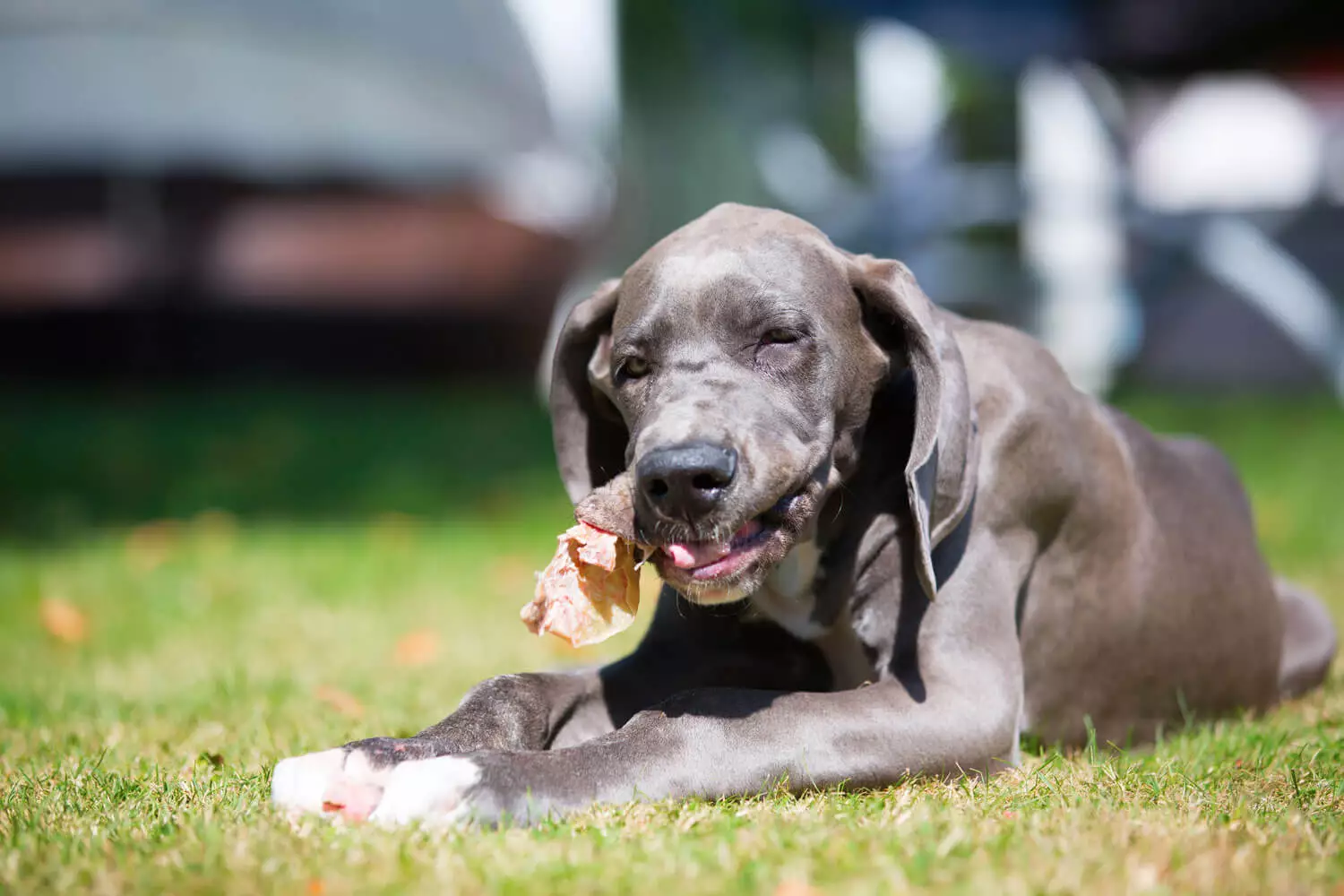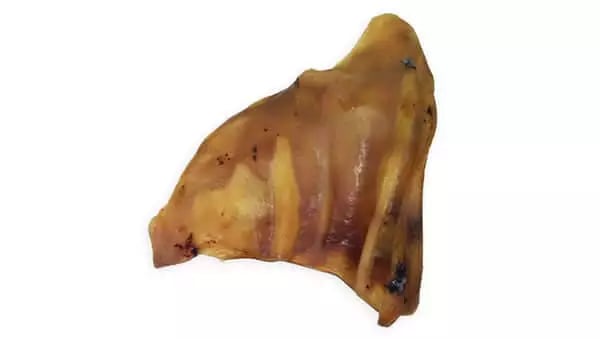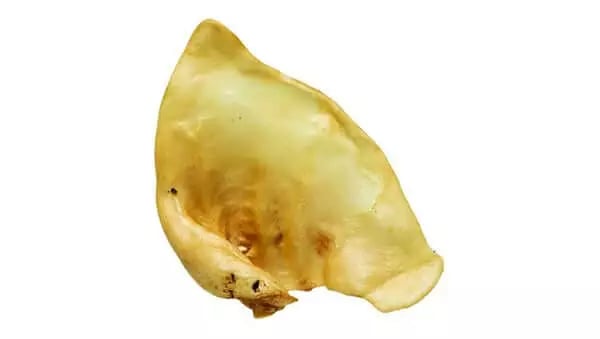
If it was up to your dog, playtime would be all day, every day! Unfortunately, most of us can’t spend hours upon hours playing fetch or tug-o-war, but that doesn't mean you can't provide your dog with other enriching activities. Pig ears are a popular natural chew, but before you offer one up to your pooch, it's important to ask are pig ears good for dogs.
A dog left to his own devices can get into some trouble. From anxiety and stress to basic boredom, dogs without activities may fill their time with unwanted and destructive behaviours. For dogs that love to chew, it's a good practice to routinely offer them something safe and appropriate to chew on.
A great way to keep your dog entertained while you tend to your human activities is to treat him to a delicious natural chew.
Among the wide variety of natural chews, pig ears are a common choice for many pet parents. They’re a flavourful chew that your doggo will love, but it's important to learn all the benefits and risks before offering your pooch this type of natural chew.
In this post, we will cover general pig ear nutrition and answer common questions like:
-
- Are pig ears safe for dogs?
- Can dogs digest pig ears?
- Can puppies eat pig ears?
- Can pig ears make my dog sick?
- Are pig ears high in fat?
All About Pig Ears for Dogs
Pig ears for dogs are, well, exactly what you think they are! A humanely harvested and dehydrated ear of a pig – specifically, a flap of the ear called the pinna. This particular part of the ear is made up of cartilage and skin with barely any muscle, making them more flexible and digestible for dogs to munch on.
If you think feeding your dog pig ears is strange, you won't believe What Bully Sticks are Made From!

There has been some controversy surrounding whether pig ears for dogs are good or bad to give. Many pet parents have been scared off from feeding pig ears because of the concern with harmful bacteria such as salmonella.
However, there’s no need to avoid pig ears altogether. The truth is, as long as they are fed responsibly, pig ears for puppies are a safe and healthy treat!
Pig ears for dogs are a nutritious alternative to rawhide or other less-than-natural dog chews. Plus, they’re a great source of protein and essential nutrients to complement your dog’s regular diet.
Like with any long-lasting chew, you’ll want to be sure you know the proper way to feed pig ears to dogs before giving one to your chewing enthusiast.
Are pig ears high in fat?
Pig ears are notoriously a higher fat chew, so they may not be the preferred choice for dogs with sensitive stomach or those struggling to lose weight. Some brands will be higher than others, depending on how they are processed, but compared to to other natural chews pig ears may not be the right choice for every dog.
Alternatives like cow ears might be a better option for pups that don't need the extra fat and calories.
Best Pig Ears for Dogs
Pig ears are a simple and widely available natural chew for dogs. There's not a ton of variety when it comes to pig ears, because they are after all a single-ingredient natural chew, but we ranked a few of our best pig ears and even a few alternative options to the classic pig ear chews.
1. ValuePack Pig Ears
ValuePack Pig Ears offer a classic, flavourful chew that dogs love. These all-natural, smoked pig ears provide a satisfying crunch while helping to support dental health by reducing plaque and tartar buildup. A great single-ingredient treat for dogs who love to chew!
2. Eldon's Premium Pig Ears
Eldon’s Premium Pig Ears are slow-roasted to lock in rich, natural flavour, making them an irresistible treat for dogs. Made from high-quality pork, these thick, long-lasting chews satisfy your pup’s chewing instincts while promoting healthy teeth and gums. No artificial additives—just pure, natural goodness!
3. Vital Essentials Freeze-Dried Pig Ears
Vital Essentials Freeze-Dried Pig Ears deliver the crunch dogs crave with the added benefits of raw nutrition. Gently freeze-dried to preserve natural proteins and flavour, these chews are lightweight, nutrient-dense, and packed with essential amino acids. A great option for raw feeders or dogs with sensitive stomachs!
4. Icelandic+ Fish Ears
Icelandic+ Fish Ears combine the best of both worlds—a chewy, natural pig ear wrapped in crispy, nutrient-rich cod skin. This unique chew satisfies your dog’s need to gnaw while promoting dental health by helping to clean teeth and gums. Made from 100% natural, responsibly sourced ingredients with no additives, these protein-packed treats offer a wholesome and delicious reward for your pup.
5. Red Barn Porky Slices
Red Barn Porky Slices are hearty, protein-packed chews made from real pig ears. These thick, oven-roasted slices offer a chewy texture that helps clean teeth and satisfy strong chewers. Naturally rich in flavour, they make a great rawhide alternative for dogs who love meaty snacks!
Pig Ear Alternatives for Dogs
Looking for something other than pork? Pig ears are not the only option for pet owners looking for a light and tasty natural chew. Here are a few other animal ears that are safe for dogs to snack on:
-
- Lamb Ears: Though they are smaller, Lamb Ears offer plenty of flavour for smaller breeds who like to chew. Try a crunchy air-dried option, like Ziwi Peak Liver Coated Lamb Ears, or the popular Big Country Raw Frozen Lamb Ears to complement a raw diet.
- Cow Ears: Larger and lower in fat than pig ears, cow ears offer a long-lasting, highly digestible chew that supports dental health and satisfies strong chewers. Check out grass-fed options like Silver Paw ASADO Cow Ears or naturally puffed Red Barn Cow Ears. For a little extra natural fibre, Noah's Ark Cow's Ears still have the fur attached to help boost digestion.
- Rabbit Ears: Naturally lean and packed with protein, rabbit ears are a great hypoallergenic chew, ideal for dogs with food sensitivities or on a novel protein diet. Charmy Rabbit Ears don't last long, but that doesn't mean they can be a tasty if not quick chew for dogs and cats.
Safety Tips for Feeding Pig Ears

While wholesome, nutritious dog foods should be the primary source of the nutrients your dog needs to thrive, a pig ear is excellent as an occasional treat that can provide a little extra nutritional value and keep boredom at bay. As long as you keep these safe feeding tips in mind, your dog can have a field day gnawing on this naturally delicious chew!
-
Trust the source.
The general rule when buying pig ears for your dog food is to make sure they’re coming from a reputable source. Some pig ears are made with rawhide, cheap grains, or coated with harsh chemicals, such as bleach, that your dog should never ingest. You want to choose a pig ear from a trusted source that avoids using these unhealthy ingredients.
-
Wash your hands.
Dogs can handle a lot more bacteria than we can. Most natural chews contain bacteria that can make people sick but are typically safe for your pooch. Pig ears for puppies are especially controversial because there have been several recalls over the years of different pig ear brands that contain salmonella.
Of course, pig ears from trusted sources don’t have the same issues, but it’s still a best practice to wash your hands after handling your dog’s pig ear treats - or any treats for that matter.
-
Always supervise your dog’s chew time.
Dogs can get a little carried away with their chewing. It’s important to keep an eye on our pets as they chew to ensure they don’t break off too big of a piece and choke!
Heavy chewers may be able to finish a pig ear pretty quickly. This can lead to an upset stomach or digestion issues. If your dog is an avid chewer, we recommend limiting his chew time to avoid him eating the whole ear in under an hour!
-
Avoid feeding dogs at risk for obesity or suffering from pancreatitis.
There is too much fat and too many calories in pig ears for dogs that suffer from weight issues or pancreatitis. For this reason, your doggo should avoid this natural chew entirely. Luckily, there are other less fattening long-lasting chews to offer your dog to reward them with something special!
Benefits of Feeding Pig Ears

1. They’re ideal for more gentle chewers.
Pig ear dog treats are tough, but not as tough as other chews you’ll find at your local pet store! That’s why they’re an excellent choice for light chewers. If you have a dog that likes to savour its treats, pig ears for dogs are great to let them chew at their own pace without lasting too long to attract harmful bacteria.
2. They’re great for puppies and senior dogs.
Are pig ears safe for puppies? Yes! As we mentioned above, pig ears are less tough than other natural chews, such as bully sticks or rawhide for dogs. That makes them safe to feed to your new puppy or your senior dog that might have a few teeth missing.
When it comes to feeding pig ears to puppies, you want to be extra careful to ensure they are coming from a trusted source. Puppies are more susceptible to digestion problems, infection and illness, so you must watch for added chemicals and unhealthy ingredients.
3. They work as a dental chew.
Despite being dried and dehydrated, pig ears maintain their thick and tough texture. This makes them more difficult for even the hardcore chewers to break them down with their teeth. As your dog continuously chews to soften up the ear, this motion works to scrub off tough-to-reach plaque build-up and helps to keep your dog’s pearly whites clean – or cleaner!
Add Pig Ears to Your Dog Chew Rotation
If you want to offer your dog something new and different from his usual rawhide bone or rubber toy, pig ears are a safe dog treat that will not only provide mental stimulation but nutritional benefits too! Most dogs go nuts for pig ears, so consider adding pig ears to your regular mix of dog chews.
Variety is key. Different chews have different benefits, so while pig ears may be a cost-effective and preferred choice, make sure you rotate between a few types of chews. This will keep the experience fun and make it more difficult for your dog to learn to shred the chews faster and faster each time.
For more chew ideas, check out Best Long-Lasting Chews for Dogs. This can help you build a purposeful and healthy chewing routine for your pet.
Frequently Asked Questions About Pig Ears
Are pig ears safe for dogs to eat?
Pig ears are generally considered safe for dogs to eat as a treat. As a calorie-dense chew, pig ears should always be fed in moderation.
Can all dogs eat pig ears?
Most dogs can enjoy pig ears without any issues. However, dogs with a history of pancreatitis or other gastrointestinal sensitivities should avoid high-fat treats like pig ears.
Are there any benefits to giving my dog pig ears?
Pig ears can provide mental and dental benefits for dogs. Chewing on pig ears can help satisfy a dog's natural urge to chew, promoting dental hygiene by reducing tartar buildup and keeping teeth clean.
How should I give my dog a pig ear?
Supervise your dog while they're enjoying a pig ear to prevent any potential choking hazards. Consider choosing appropriately sized pig ears for your dog's breed and size.
Can pig ears cause any health issues in dogs?
While pig ears are generally viewed as safe, there have been cases of bacterial contamination in commercially sold pig ears. Make sure to purchase high-quality pig ears from reputable brands and sources to minimize this risk.
How often can I give my dog pig ears?
Pig ears should be given as an occasional treat, not a regular part of your dog's diet. Once or twice a week is generally a good guideline but adjust based on your dog's size, activity level, and diet.
.png?width=200&height=66&name=logo%20(1).png)







